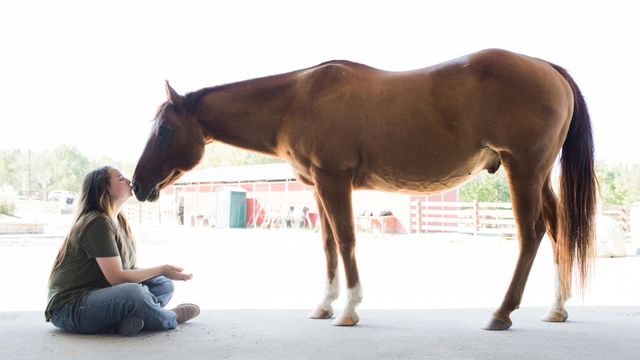Hope Reins connects children with rescued horses for emotional healing
A mental health program for children in north Raleigh is working around COVID-19 social distancing orders by connecting their participants with what they call "Digital Hope."
Posted — UpdatedThe staff and volunteers believe that horses help humans learn more about the importance of trust, communication, boundaries and leadership.
Sandy Foster said she could not believe how much a horse help her 8-year-old son, Troy. Foster said Troy was "a very angry little boy, sad and confused" after his dad committed suicide.
Friends referred the Fosters to Hope Reins, a 33-acre home to horses rescued from neglect or abuse. It's where Troy met a chestnut horse named Tinker Bell.
"It shows him these horses went through a lot and they are happy now," Foster said. "Maybe I can be happy too."
Hope Reins' founder and CEO Kim Tschirret began the nonprofit mentoring and horse therapy program in July 2010 with only one Shetland pony.
"The very first thing God did was give us a 20-acre rented piece of property off Creedmoor Road for a dollar a month," said Tschirret.
Tschirret's own background, growing up with an abusive and alcoholic father, inspired her life's mission. "I never knew safety as a little girl," said Tschirret. "But I had a horse, so that was my comfort and my safety and the place I went to when I needed somewhere safe."
Offered to families free of charge, the nonprofit serves children suffering from traumatic experiences. Hope Reins has helped children from 16 counties in North Carolina and many others from South Carolina and Virginia.
Tschirret said, even before the pandemic, the state was facing a mental health crisis. "There just aren't enough services to go around for the kids who need it," said Tschirret, who is concerned about outcomes in troubled youths without intervention. "Traumatized kids need safety and stability."
While COVID-19 restrictions are in place, the Hope Reins' website offers a way to reach the kids with "Bits of Hope," which are video-stories about the horses.
Volunteers also use Facebook Live to provide a "prayer gathering" and Bible message.
Foster said that separation from the horse farm has been difficult for Troy. What has made it easier is that ranch volunteers always speak about "when," not "if" the kids can reconnect with their horse.
"That means a lot to little kids, especially a little kid who has lost so much in such a short period of time," she said.
Copyright 2024 by Capitol Broadcasting Company. All rights reserved. This material may not be published, broadcast, rewritten or redistributed.





